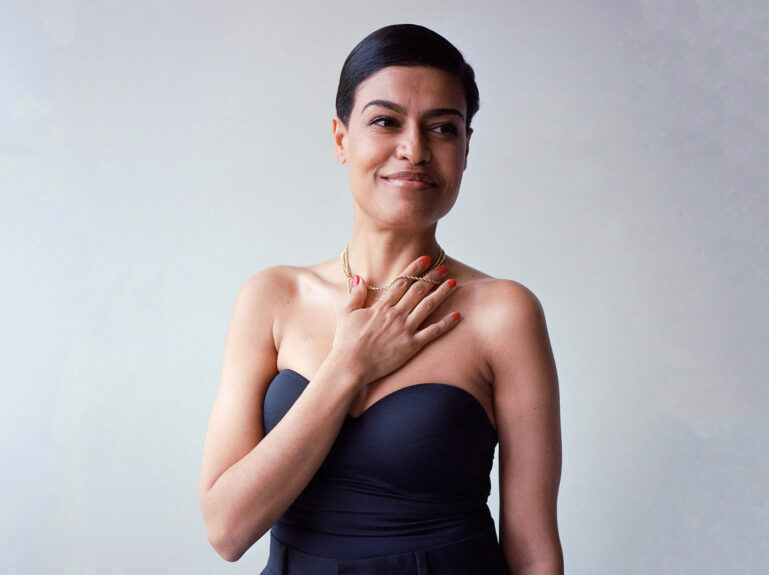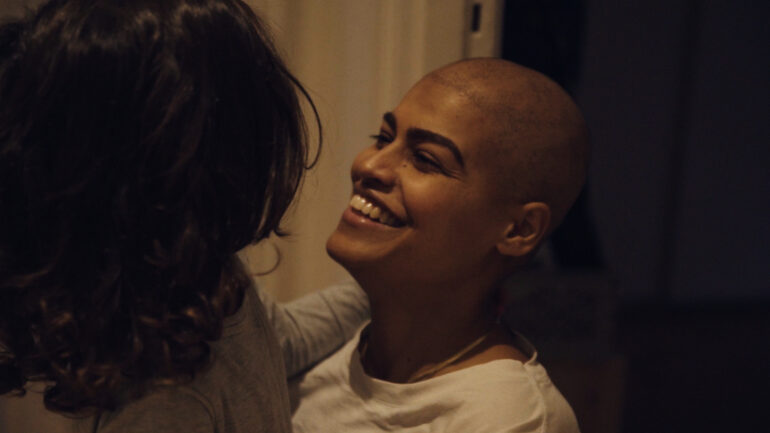Written by: Marta Balaga
29.08.24
Roja Pakari talks about her personal documentary The Son and the Moon.
The Danish documentary The Son and the Moon (Min arv bor i dig) is nominated for the Nordic Council Film Prize 2024. Roja Pakari, nominated for the Film Prize as writer/director, decided to turn the camera on herself in the documentary, co-directed with Emilie Adelina Monies.
In the film, written by Pakari and Denniz Göl Bertelsen, she talks about her own battle with cancer. Diagnosed while pregnant, she fought for her life, but the film is not just about debilitating illness or fear. Pakari, who graduated from the National Film School of Denmark, also includes her family and celebrates her Iranian roots. Sara Stockmann produced the film for Sonntag Pictures.
It really feels like documentaries are finally being noticed, winning main awards at the biggest festivals all over the world. Or, in your case, getting nominated for the NCFP.
In Denmark, documentaries are quite big, but not in cinema theatres. People watch them on television. However, we tried to make our film really cinematic – that’s what I always wanted. Emilie Adelina Monies, who co-directed with me, is a good friend of mine. The way she shot it makes you feel like you are allowed to be present, allowed to stay in these personal spaces. When we were making it, I thought: “It might be my first and my last film, so I have to go all in.” All three of us, Emilie, Denniz Göl Bertelsen and me, we gave it our all.
Why did you decide to co-direct with Emilie?
When you decide to make documentaries in Denmark, they tell you: “If you don’t know what to do in a difficult situation, just pick up your camera and see what happens.” That’s what I did at the beginning, but then I couldn’t go on, because I got so sick.
Emilie asked me: “Do you want me to continue?” I said yes. I needed her to make these decisions. When I was in a coma, she decided that whenever my eyes closed, she would stop filming. She had to set up these rules for herself, because I was fighting for my life. When I woke up, that was the only time I asked her to turn off the camera. My husband told me what happened, and it was too much for me. Later, I started wondering what I wanted to say with this film. I didn’t want to tell a story about falling ill: I wanted to show what happens later.
There are so many layers to this film. It’s also about your family, your past, and longing for Iran: a country you can no longer visit.
When I decided to tell this story to my son – because this film is for him – I knew I needed to tell him who I am, where I came from and how I ended up here. I needed to go all the way back. I knew there was all this material, photos and videos from my childhood, but I didn’t know what I was looking for. I certainly wasn’t sure if people would find it interesting. My Iranian heritage is important to me. As a mother, it’s my responsibility to tell him about it, and if I can’t, at least now he has this film.
The NCFP jury underlined that your film is universal. Were you surprised by this? People can understand the film, even if they don’t go through the same struggles.
It was never supposed to be a film just for people with cancer. It’s about being a mother, a daughter, a wife. When we talked to the Danish Film Institute and I told them I wanted to make it for my son, they understood. Everyone wants to leave something to their children, and we all go through trauma.
In the future, would you like to be in front of the camera again?
No! I hope I will never do that again. Even when I was watching the footage, I was always referring to “her”. It made things easier, but sometimes I still had to leave the room. That’s why it was so good to have Emilie and Denniz with me, which is not to say it wasn’t difficult for them too.
Suddenly I could see myself reacting to many things, which was therapeutic, but also so hard. Now, after the premiere, I feel I can finally let go. I can breathe again. These six years have been amazing, but I am done with it now. You are always nervous before a film comes out, and I was also thinking about my son: “Will other kids torment him, telling him his mum was so sick? How do I deal with that?” Today I am well, but he knows about cancer, and he knows there’s a film. He’s not going to watch it now, he is too young, but it’s there.
There is so much warmth in The Son and the Moon, but you aren’t aggressively upbeat. I guess you didn’t want to pretend everything was perfect?
When I was very sick, I hated it when people tried to be overly optimistic. I knew they meant well, but I didn’t want to be “strong”. I didn’t choose this – I just wanted to be healthy. I was bitter, angry, and I felt it was unfair. I had to go through all these emotions, because in order to finally have some hope, you first need to be able to say: “This is shit.” [laughter]
I want people to see it’s a long journey. There is no guide – you have to figure it out by yourself – but I can give you some tools. I can hand you this film, saying: “Hey, maybe this can actually help you.” It helped me, and I am ready for a new project. I am happy.
Official trailer:
The documentary will be screened at Oslo Pix, Helsinki International Film Festival and NCFP events in Copenhagen, Stockholm and Reykjavík. To read more about The Son and the Moon: CLICK HERE.
The Film Prize was first awarded in 2002 and then permanently established in 2005, and is to be juxtaposed with the Nordic Council Literature Prize, the Children & Young People's Literature Prize, the Music Prize, and the Environment Prize. The winner of the prizes will be announced October 22 via RÚV.

